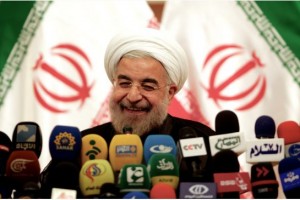 TEHRAN �What immediately strikes you when you walk down the streets of Tehran is that Iran is a nation of young people. More than 60 percent of Iranians are under the age of 30 � and they make up nearly half the voters.
TEHRAN �What immediately strikes you when you walk down the streets of Tehran is that Iran is a nation of young people. More than 60 percent of Iranians are under the age of 30 � and they make up nearly half the voters.And it�s that voting power that is responsible for the fact that a new reform-oriented president,Hassan Rouhani, was inaugurated�this weekend. As NBC�s Ann Curry talked to young people in the bazaar in Tehran Saturday, it was clear they are expecting a lot.
Azita, a pharmacist shopping in the bazaar who asked to be identified by only her first name, was optimistic about the new leadership.
�Right now, my people, I can see happiness,� she said. She hopes Iran can end its diplomatic isolation over the nuclear issue
�It�s better we compromise between Iran and the U.S. It�s better we compromise to have a better life than having nuclear power.�
Rouhani officially became the president of Iran Saturday�after receiving the approval of Supreme Leader Ayatollah Ali Khamenei�in a ceremony at the leader�s compound, which was broadcast on state media.
In the euphoria following the 1979 revolution, Ayatollah Khamenei urged people to have as many children as possible. The resulting baby boom doubled the population, but the bulge is now making itself felt in the politics of this historically conservative nation.
In the United States, politicians fear the voting power of the baby boomers and vow to protect Social Security or Medicare. In Iran, the millennials have a similar clout.
While the world is looking to Rouhani with the hope that he will negotiate an end to the dispute over Iran's nuclear program, at home his government will have to grapple with deep disillusionment among many young people.� Politicians have a lot on their plates � in a bad economy, even university graduates struggle for years to find a job.
Some 70 percent of the unemployed are young, according to a study from the�United States Institute of Peace, an independent, nonpartisan, federally-funded institution with the mission to manage international conflict without violence.
The incoming president, much like President Barack Obama, is seen as the candidate of hope and change. Turning the economy around will take time, but change is already in the air.
During the regime of former President Mahmoud Ahmadinejad, so-called morality police had periodic crackdowns when they would patrol the streets stopping women if their heads were not fully covered or their clothing was not deemed modest enough.
The morality police have been a source of resentment among many younger women, a symbol of the oppressive government.
Walking around Tehran during inauguration weekend, there was no sign of the morality police � they are now gone. Young people said they disappeared shortly after Rouhani's election. Why they are gone or whether they will return, no one can give a sure answer.
Not unlike the United States in the 1960s, Iran finds itself in a battle of generations. The old remember the brutally repressive regime of the shah who was a virtual puppet of the U.S. They celebrate the revolution and the takeover of the U.S. Embassy.
But the young simply worry about jobs and the quality of life.
And so, for them, the new president has said all the right things. He said it is wrong for religious police to confront young women about how they wear the hijab: �I think that many of our women do not observe the appropriate legal hijab, but they are following the codes of modesty.�
For a long time, men and women have been segregated in universities. Religious police even confront couples holding hands. But Rouhani now says: �I assure you that the ideals of the Islamic Republic of Iran did not include the suppression of joy and jubilation �. No society throughout history has managed to segregate genders.�
For years, the government has blocked portions of the Internet � primarily Western news agencies websites.
�I wish the supporters of filtering could explain how they have succeeded to limit people�s access to the news,� Rouhani has said.
Ali, a student we met in the bazaar who also asked to be identified by just his first name, agreed with Rouhani call to end Internet censorship.
�We built the Islamic Republic to get out of a dictatorship; this country should be different from North Korea.� We are meant to have freedom.�
The world is looking to Rouhani to break the impasse over nuclear arms � the young of Iran are asking even more.
By Tom Bettag, Producer, NBC News
The Iran Project is not responsible for the content of quoted articles.










